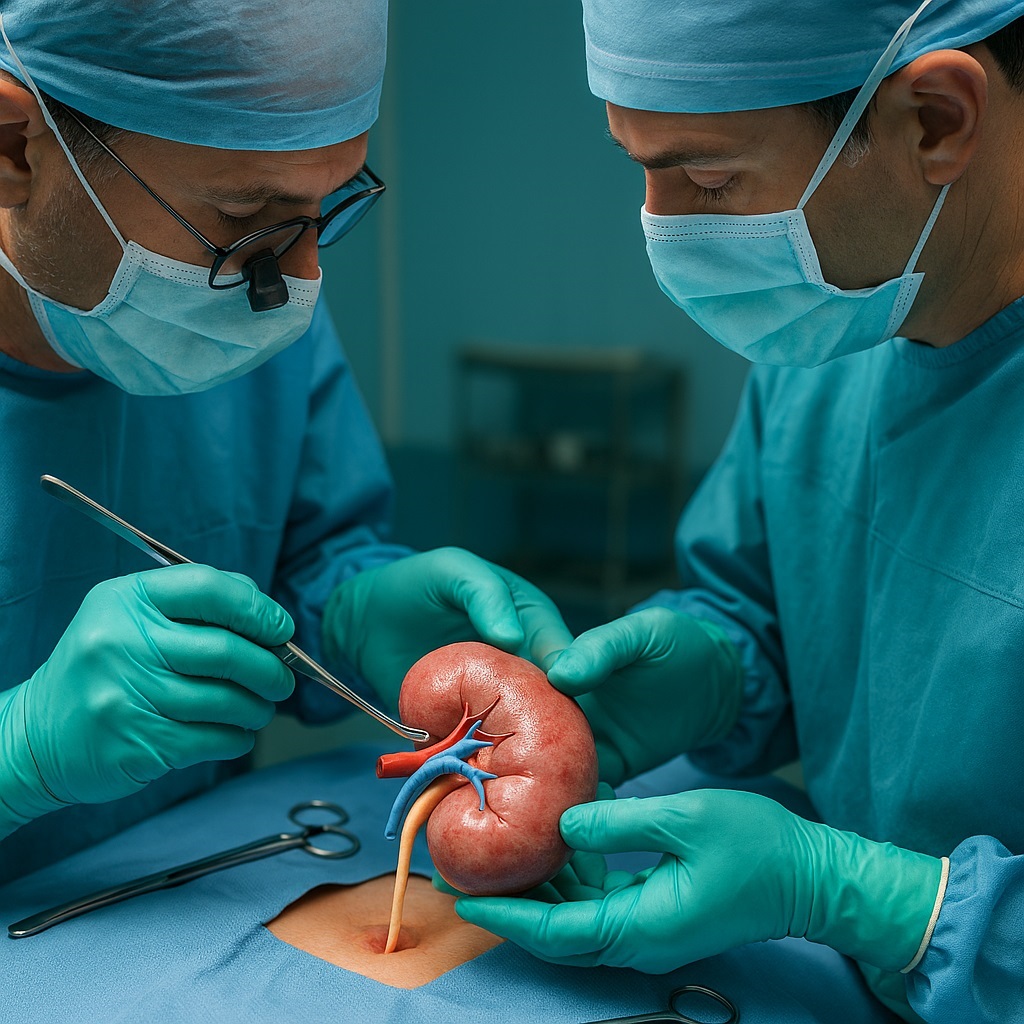Kidney Transplant in Turkey: A Comprehensive Guide to World-Class Care
A **kidney transplant in Turkey** is a procedure that can truly change a person’s life, especially for those suffering from end-stage renal disease. The journey to finding a suitable donor and hospital can feel overwhelming. However, Turkey has emerged as a global leader in medical tourism. This comprehensive guide will explore why Turkey is a top destination for kidney transplants, covering the process, costs, and a step-by-step guide to your treatment.
Understanding Kidney Transplant: A Vital Procedure
A kidney transplant is a surgical procedure that places a healthy kidney from a living or deceased donor into a person whose kidneys have failed. In fact, it’s the gold-standard treatment for **end-stage renal disease**, offering a better quality of life and a longer life expectancy than dialysis. For instance, people with kidney failure experience symptoms such as swelling in the legs, fatigue, and nausea, which severely impact their daily lives. Therefore, a transplant offers a new beginning.
During the procedure, surgeons place the new kidney in the lower abdomen and connect its blood vessels and ureter. Typically, they leave the patient’s old kidneys in place. Ultimately, the new kidney takes over the function of filtering waste from the blood. This process reverses many of the symptoms of kidney failure, allowing patients to live a more active life. Learn more about the procedure from Mayo Clinic.
Why Choose Turkey for a Kidney Transplant?
Turkey has rapidly become a hub for medical tourism, particularly for complex surgeries like kidney transplants. First and foremost, the country boasts an impressive healthcare infrastructure with state-of-the-art hospitals and clinics. Furthermore, the costs are significantly lower than in many Western countries, making world-class care accessible to more people. In addition, the expertise of Turkish surgeons is a major draw. Many are Western-trained and have extensive experience in advanced transplantation techniques, including laparoscopic procedures that result in faster recovery times. The Turkish healthcare system also has stringent regulations that ensure high standards of patient care and safety. Consequently, you can have confidence in the quality of treatment you receive.
Expertise of Surgeons and Advanced Medical Technology
Surgeons specializing in kidney transplantation in Turkey are highly skilled. They often have fellowships and training from leading institutions in the US and Europe, which means they are at the forefront of surgical innovation. Furthermore, hospitals in major cities like Istanbul and Ankara are equipped with cutting-edge technology, including advanced imaging, robotic surgery systems, and fully integrated care units. This state-of-the-art equipment allows for precise surgeries and optimal patient outcomes.
Affordability Without Compromising Quality
The cost of a kidney transplant in Turkey can be as much as 70% lower than in the United States or the United Kingdom. However, this affordability doesn’t mean a compromise on quality. The lower costs are a result of lower operating expenses and currency differences, not a lack of quality. For example, the cost of a private hospital room, nursing staff, and medical supplies is significantly less than in other countries. As a result, patients can access premium medical care without the financial strain. For more details on global costs, check out this study on medical tourism for transplantation.
How to Get a Kidney Transplant in Turkey: A Step-by-Step Guide
Navigating a medical journey abroad can seem daunting, but with the right guidance, the process can be smooth. Following these steps will help you prepare for your **kidney transplant in Turkey**.
Step 1: Initial Consultation and Evaluation
First, you’ll have an initial virtual consultation with a specialist surgeon from a Turkish hospital. You will discuss your medical history, current condition, and all your options. The medical team will review your diagnostic reports and determine your eligibility for the procedure. To begin the process, you may need to provide records from your local doctor.
Step 2: Legal and Logistical Preparations
After the initial consultation, you must complete a series of legal and logistical steps. This includes visa applications, travel arrangements, and organizing accommodation for both you and your living donor (if applicable). Companies like WMedTour can help with these arrangements, ensuring a seamless experience from start to finish. For more information, you can visit our contact page.
Step 3: Donor Matching and Surgical Preparation
If you have a living donor, both you and the donor will undergo comprehensive medical tests to ensure compatibility. These tests include blood typing, tissue matching, and a full psychological evaluation. If a deceased donor is the plan, you will be placed on a waiting list. Additionally, you will be given specific instructions on diet and medication in the weeks leading up to the surgery.
Step 4: The Surgical Procedure
The surgery typically takes 3-5 hours. The donor procedure is often done laparoscopically, which leads to minimal scarring and a quicker recovery for them. Conversely, the recipient’s surgery is more complex. Once the new kidney is placed, it will begin functioning almost immediately. You will be closely monitored in the hospital’s intensive care unit before moving to a private room.
Step 5: Post-Operative Care and Recovery
After the surgery, you will remain in the hospital for about 10-14 days. During this period, you will receive immunosuppressive medications to prevent your body from rejecting the new kidney. The medical team will teach you how to care for yourself at home, including diet and medication management. To maintain your long-term health, it is important to attend follow-up appointments and adhere strictly to all medical advice.
Kidney Transplant in Turkey vs. Other Destinations
When considering a medical journey abroad, it’s wise to compare your options. While many countries offer advanced healthcare, Turkey and Iran provide a unique blend of quality and affordability. Below is a comparison table to help you make an informed decision.
| Country | Average Cost (USD) | Key Advantages | Best For |
|---|---|---|---|
| United States | $300,000 – $500,000+ | Pioneering research, top-tier surgeons, extensive waiting lists. | Patients with excellent insurance or access to top academic centers. |
| Turkey | $35,000 – $55,000 | Highly skilled surgeons, modern JCI-accredited hospitals, short waiting times for living donors. | Patients seeking a balance of high quality, quick access, and affordability. |
| Iran | $15,000 – $25,000 | World-renowned surgeons, very low cost, no waiting list for living donor transplant. | Patients prioritizing exceptional affordability with top-tier expertise. |
| India | $12,000 – $18,000 | Extremely low cost, high volume of procedures. | Patients on a strict budget. |
As the table demonstrates, both Turkey and Iran offer compelling alternatives to Western countries. For instance, Turkey provides a comprehensive solution with a high standard of care and reasonable costs. Conversely, Iran stands out for its unmatched affordability, making it an excellent choice for patients looking for the highest value. For more detailed information, you can visit our page on Urology and Nephrology.
Key Factors to Consider Before Your Journey
Before you decide, it’s crucial to consider several factors to ensure a successful transplant journey. First, verify the hospital’s credentials, such as JCI (Joint Commission International) accreditation, which signifies adherence to strict international standards. It’s also wise to research the surgeon’s experience and success rates. In addition, you should think about the logistics, including language barriers and accommodation.
A reputable medical tourism facilitator like WMedTour can make this process stress-free. We handle everything from finding the right hospital to arranging flights and local support, ensuring you can focus on your health. To review our team of expert doctors, visit our doctors page.
Final Thoughts: Your Path to a New Life
A kidney transplant is a journey, but it is one that offers the promise of a healthier, fuller life. Turkey’s combination of medical excellence, advanced technology, and competitive pricing makes it an increasingly popular destination for patients worldwide. By considering all factors and choosing a trusted partner, you can embark on this journey with confidence.
In summary, a **kidney transplant in Turkey** represents a wise investment in your future. For more information or to schedule a free virtual consultation, please don’t hesitate to contact us today. Your new life is waiting.
Frequently Asked Questions About Kidney Transplant
What is a kidney transplant?
A kidney transplant is a surgical procedure that replaces a failing kidney with a healthy one from a living or deceased donor. It is considered the most effective treatment for end-stage renal disease (kidney failure).
Who is a suitable candidate for a kidney transplant?
Generally, any patient with end-stage kidney disease who is healthy enough to undergo surgery can be a candidate. They must be free of active infections and cancer. A comprehensive medical evaluation is required to determine eligibility.
How long is the waiting list for a kidney transplant in Turkey?
The waiting list for a deceased donor kidney can vary. However, for a living donor transplant (which is more common for international patients), there is often no waiting list once a suitable donor is found and all medical evaluations are complete.
How long does a kidney transplant surgery take?
The surgical procedure typically takes between 3 to 5 hours for the recipient. The donor surgery, if living, is usually shorter, especially with laparoscopic techniques.
What is the cost of a kidney transplant in Turkey?
The average cost of a kidney transplant in Turkey ranges from $35,000 to $55,000. This is a fraction of the cost in Western countries and typically includes hospitalization, surgical fees, and initial medications.
Will my insurance cover the cost of a transplant in Turkey?
Most private health insurance policies do not cover medical procedures performed outside your home country. It is essential to check with your insurance provider directly before making any arrangements.
What is the success rate of kidney transplants in Turkey?
Success rates in Turkey are comparable to those in top-tier Western hospitals. One-year graft survival rates often exceed 95%, and five-year survival rates are over 80%.
Are there any legal restrictions for international patients getting a transplant in Turkey?
Turkey’s laws require a close family relationship between the living donor and the recipient. Non-family donation is highly regulated and requires approval from an ethics committee. This ensures the ethical integrity of the transplant system.
What is the recovery period after a kidney transplant?
Patients are typically hospitalized for 10-14 days. Full recovery can take several months. Immunosuppressive medications will be required for the rest of your life to prevent rejection of the new kidney.
What are the main risks of kidney transplant surgery?
Risks include surgical complications like bleeding and infection, as well as rejection of the new kidney. The surgical team will carefully monitor you and manage these risks with medication and follow-up care.
What medications will I have to take after the transplant?
The primary medications are immunosuppressants, which suppress your immune system to prevent it from attacking the new kidney. These must be taken as prescribed for the rest of your life.
What is the long-term outlook after a kidney transplant?
With proper care and medication, a kidney transplant can significantly improve your quality of life. The average lifespan of a transplanted kidney is about 15-20 years for living-donor kidneys and 10-15 years for deceased-donor kidneys.
How do I choose the right hospital for a kidney transplant in Turkey?
Look for hospitals with JCI accreditation, a high volume of transplant surgeries, and surgeons with international experience. A medical tourism facilitator can help you vet these options.
What is the role of a living donor?
A living donor is a person who donates one of their kidneys to a recipient. They must be in good health and a suitable match. This type of transplant often has a higher success rate and can be performed more quickly.
How is organ donation regulated in Turkey?
Organ donation in Turkey is strictly regulated by the Ministry of Health. The country has a robust legal framework to ensure ethical practices and prevent organ trafficking.
What is a JCI-accredited hospital?
JCI stands for Joint Commission International. It is a non-profit organization that accredits healthcare organizations worldwide. A JCI-accredited hospital meets rigorous international standards for patient safety and quality of care.
Will there be a language barrier?
Most major hospitals in Turkey that cater to international patients have dedicated staff who are fluent in English and other languages. Translation services are also readily available.
Can I travel after my kidney transplant?
After the initial recovery period (usually a few weeks to a month), you can travel, but you should discuss this with your doctor. It’s important to have a stable health condition and access to your medications.
How does WMedTour help with the transplant process?
WMedTour serves as a full-service medical tourism facilitator. We handle all logistics, from initial consultations and travel arrangements to on-the-ground support and post-operative follow-up, simplifying the entire experience for you.
Are there other services offered besides the surgery?
Yes, many hospitals offer comprehensive services including psychological counseling, dietary advice, and long-term follow-up care. A medical tourism company can also arrange for accommodation and transportation.




